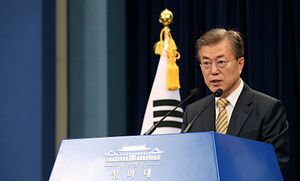South Korean President Moon Jae-in’s novel approach to resolving domestic economic challenges had a relatively smooth start, but now that the strategy is up and running the administration faces its first major hurdle as citizens start to negatively react to policy outcomes.
Elected on a mandate of economic and social reform, largely focused on creating jobs and reducing inequality, Moon has started following through on many of his campaign promises in his first year through his strategy known as J-nomics. He has raised the minimum wage, lowered the maximum workweek from 68 hours to 52 hours, and has championed a public sector-led effort to create jobs throughout the rest of economy. While these initiatives were heralded as the solution the country’s woes, their initial results have not met the perhaps too high expectations.
Following a series of lower than expected job reports this year, the 5,000 new jobs created in July compared to last year is the least amount of jobs added since January 2010. The minimum wage increase and shorter workweek have also been problematic. To reach Moon’s campaign promise of a 10,000 won (about $9) minimum wage by 2020 the minimum wage would need to be raised by an average of 15.3 percent over the next two years. However, in the face of staunch opposition from small business owners, claiming that such hikes would lead to massive layoffs, the administration settled on a 10.9 percent raise, prompting a personal apology from Moon for the failure to fulfill his election pledge. Despite the compromise, small businesses are still concerned this raise is too high. A shorter workweek was intended to provide overworked Koreans a better work-life balance, but for many of the most vulnerable workers it has only forced them to take on extra jobs to make up for lost income, though many temporary jobs are also disappearing due to the minimum wage increase.
The mixed results of J-nomics have only just recently made a significant impact on Moon’s approval rating. Moon’s advancement of inter-Korean dialogue buttressed his public approval earlier this year, but the latest polling suggests unresolved economic challenges are becoming more of a concern. From his 83 percent approval rating in the first week of May, just after the summit with North Korean leader Kim Jong Un, Moon is now down to just 58 percent in the most recent survey for August. Of those who viewed Moon negatively, the most cited reason was the lack of resolving economic issues, raised by 40 percent of respondents, followed by the minimum wage increase, mentioned by 10 percent.
The troubles surrounding the economic reforms attempted so far have certainly not gone unnoticed by the administration, though there seems to be a divide on how to move forward. Earlier this week, recognizing a worsening job market, Finance Minister Kim Dong-yeon suggested possibly adapting future government measures, saying, “We will examine the effect of economic policies implemented so far and consider improving or modifying them if necessary.” However, presidential chief of staff for policy Jang Ha-sung blamed a weakening job market on structural problems and argued for staying the course, stating, “If the government’s income-led growth strategy, as well as policies for innovative growth and a fair economy, start taking effect, the economy will gain vitality and sustainability. I am sure that the low-income and middle classes will be given the fruits [of economic growth], while the job market will also improve.”
Whether policy modifications or patience is needed can be debated, but the stakes are certainly much higher now as sluggish growth starts to affect Moon’s approval rating. The perceived effectiveness of J-nomics moving forward will play a larger role in its sustainability. Even if waiting for results were the best of course of action economically, not making adjustments as South Koreans start reacting negatively to policy outcomes — or in other words purposefully faltering at the first hurdle — will only exacerbate the political cost of these measures. The administration could look to find more balance between the income-led growth policies that have been heavily pursued so far and the other pillar of J-nomics, innovative growth, but new spending for innovation is still modest compared to the earmarks for income-led growth.
Although Moon had to make compromises and struggled at times to put his economic plan in motion, everything before this point was likely less of a challenge than what is to come. The real test for J-nomics is only just starting.

































